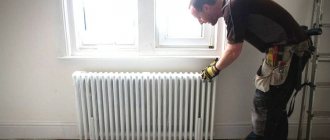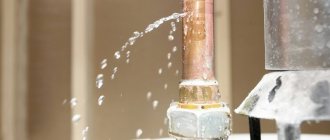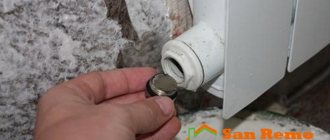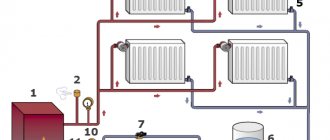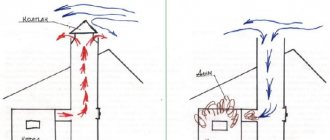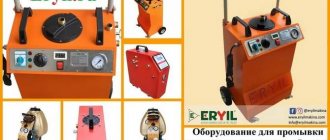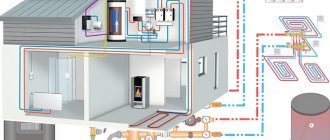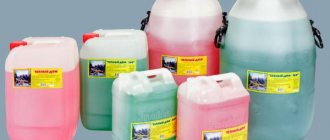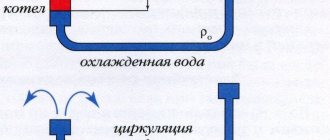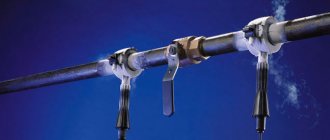Knocking in the heating pipes of a private home is a common occurrence for owners with individual heating. Why the noise occurs and what influences it is necessary to understand.
The main indicator of trouble is poor-quality coolant containing dissolved salts and mechanical impurities.
Causes of noise
There are actually not so many reasons for knocking in heating pipes when heating. Some noise can be ignored - it does not harm the system or heating devices. But noises such as buzzing, crackling, knocking, gurgling, and howling should give reason to think and take urgent action.
Common reasons:
- air pockets in the system;
- clogging or overgrowing of pipes due to poor-quality coolant;
- leaks in the pipeline;
- violation of installation work when installing taps, valves and laying pipes;
- failure or wear of working equipment;
- cavitation, an increase in pressure in places where the diameter of pipes increases (decreases);
- incorrect calculation or non-compliance with design recommendations when installing the heating system.
These circumstances arise in private closed-loop systems and make us think about their urgent elimination.
The circulation pump in the heating circuit system promotes forced movement of water, which leads to uniform heating and displacement of accumulated air from the system.
If the heating in a house or apartment is connected to a central pipeline, then startup, accompanied by similar sounds, is normal. Water, filling the general system, pushes out air, and, flowing along the contour, is accompanied by gurgling, knocking and crackling sounds.
As soon as the equipment enters operating mode, the general adjustment of the system will end - the temperature of the batteries will increase, and everything will stop. This is clearly visible in the diagram of heat supply to consumers from the central boiler house.
According to experts
Vladimir Savotkin, heating equipment installer: Recently, modern radiators have become especially popular. They are often installed in old heating systems. But, since the material of old pipes and new radiators has different physical properties, including the coefficient of expansion, the difference in the change in the size of the heating elements can sometimes cause a very loud crackling sound in the apartment.
Konstantin Ustinovich Petrov, specialist in installing radiator heating systems: pipes in the heating system often make noise during startup. At this time, pressure drops are observed in the return and supply pipelines, which may exceed the normalized values. This is why the water makes noise in the heating pipes. As houses are connected to a centralized heating system, the clicks become weaker over time and disappear completely. This is a normal phenomenon and there is no need to be afraid of it.
Types of noise in pipes
The noises that accompany the general heating start-up differ from emergency ones - they are intermittent and are accompanied by gurgling or gurgling. In bimetallic or aluminum batteries, a crackling or buzzing noise may be heard - this is also normal.
It is clear that prolonged noise is unpleasant, so it is necessary to prevent the situation in a timely manner.
The knocking and hum that occurs in the room with increasing force give reason to be wary and take drastic measures:
- Check heating devices and temperature conditions in the circuit. If a pump is installed, then its operation.
- Pay attention to the valves - if they break, a characteristic whistle appears. Sometimes a small adjustment is all it takes to get the equipment working.
- Having discovered visible problems, you need to stop the coolant and turn off the heating devices. Having assessed the breakdown, proceed to eliminate the accident yourself or invite a specialist.
These are primary measures that can prevent the development of major destruction.
And the neighbors are noisy too
More often than not, it's not just you and your family who suffer this. Therefore, you first need to go around the neighbors along the riser to identify the location of the noise.
Now, as for the nature of the buzz. Heating pipes, like water pipes, can emit single or rhythmic sounds, something like tap dancing, rustling, gurgling, or even generally vibrate and even hum – periodically or constantly. The reasons can be completely different, they are even classified into groups. But now we will not consider absolutely all of them, but will focus only on impact noise effects.
Note: The likelihood of noise in pipes is sharply reduced if you use metal-plastic or plastic pipes instead of metal and copper. This is explained by the high sensitivity of steel pipes to low-frequency vibrations and high rigidity. Although their material is much stronger. It is recommended to use ball valves rather than screw valves as shut-off valves, which are controlled by turning the handle. These are heavy cast copper products, not Chinese-made products made from light alloy material.
Sounds from heating devices
If you hear a howl in the middle of the night, then most likely the system has leaked. A cloud of steam and a characteristic whistle will immediately indicate a gust or a failed valve. In some cases, it is enough to close the tap to bring the heating system into working condition.
If no obvious causes are found, and the howling is accompanied by a crackling sound, it is necessary to check the pressure. Perhaps the flying scale blocked the free flow of the coolant, which caused increased pressure - it is urgent to stop the boiler, drain the water and look for the problem.
It happens that the batteries start to “shoot” - this is another reason to be wary. Such noise is typical for bimetallic batteries when the pressure in the system does not coincide with the calculated one.
When purchasing heating appliances, you need to take into account the operating parameters of the boiler and select the appropriate radiators. Otherwise, the problem may result in a rupture of the heating device due to water hammer, which is completely inappropriate in the winter cold.
Heated water is not able to compress; it needs to move freely along the contour. Banal deposits in pipes can provoke an increase in pressure and rupture of pipes due to water hammer.
Another reason is an air lock, which can be eliminated through the Mayevsky drain valves located at the ends of the batteries. The procedure is simple, and anyone can handle it.
Let's sum it up
From this article you learned why batteries make noise in an apartment or private house. We have identified the main reasons for the appearance of extraneous sounds:
- Incorrect pipe diameter;
- Incorrect pipe installation;
- Pressure changes;
- Air jams;
- Mounting brackets;
- Thermostat;
- Circulation pump;
- High coolant speed;
- System littering;
- Embedding pipes into the wall;
- Water leak;
- Wear of gaskets;
- Coolant;
- Depreciation of equipment.
We hope that the article was useful to you. Leave your opinions and questions in the comments. Don't forget to share the post with your friends!
A common phenomenon that can be encountered in apartment buildings or private buildings is various types of noise emanating from the heating system. Like any excess noise in communication systems, humming, crackling or knocking in heating pipes have their reasons, and if they are not eliminated, along with psychological discomfort for residents, this can lead to serious problems in the heating system of a residential building.
Pump noise
A common cause of problems is pump operation. Typically, it has three positions to raise the water column to a certain height, which depends on the power of the device. The uniform movement of the coolant along the thermal circuit is not accompanied by noise effects.
If you hear strange sounds that sound more like mechanical sounds, you should check the operation of the pump.
In case of failure:
- water gurgles in the heating pipes of a private house;
- a hum appears;
- cracking is possible;
- The boiler begins to make noise and knock.
In this case, you need to turn off the pump, and if the sounds stop, then the reason has been found. Cracking and noise are mechanical damage: this means that the graphite sliding bearings have worn out or dirt has gotten into the housing.
Scale settles on the inner walls of the pump due to poor-quality coolant and has a destructive effect on its components.
Checking is simple:
- it is enough to remove the pump;
- lower its working part into a container of water;
- when turned on, it must pump water; if this does not happen, it must be repaired.
Important! The pump cannot be turned on without water.
Hissing and whistling
If the radiator hisses or whistles, this is a sign of a water leak. Moreover, the location of the leak can be anywhere in the heating system. Sometimes water comes out in a heating pipe embedded in the wall, and the sound comes from a radiator 10 meters away.
If you live in a multi-storey building and have not found an obvious leak in your apartment, talk to your neighbors. Maybe somewhere in a secluded corner they have already accumulated a puddle. If you can't find an obvious place, you should check:
- Parts of pipes embedded in ceilings and walls;
- Common riser;
- Places where the riser passes through the ceilings.
In a private home, also check all heating system equipment. From pumps to heat sources.
Extraneous sounds in the heating boiler
Sometimes the heating of the boiler is also accompanied by some sounds. When cold equipment heats up and begins to crack, the characteristic clicks should not cause panic - metal makes such sounds when it warms up.
Gurgling and gurgling are also possible - this is also a normal phenomenon: the coolant began to heat up and set the system in motion. However, the same sounds can occur if there is insufficient coolant in the pipes. In this situation, it is enough to add water to ensure uniform heating.
Cotton
You can hear such sounds if the gas outlet pipes are clogged. This happens when the boiler is ignited: the accumulated gas, without having time to escape, creates a bang. This is dangerous, as a sudden burst of flame can cause burns or fire.
If the boiler is gas, then the reasons for such noise are clogged nozzles or a malfunction of the three-way valve. In this situation, it is necessary to clean the equipment from soot.
Knock
The occurrence of a knocking sound in the boiler indicates its incorrect installation or unregulated operation of the pumping equipment. If the pump operates unevenly, moving the coolant in jerks, resonance occurs between the boiler and the pump, accompanied by a characteristic knocking sound. In this case, it is necessary to regulate the operation of the pump.
Sounds in different boiler models
Noise can occur for a trivial reason, which lies in the boiler model itself. This is typical for gas boilers equipped with ventilation burners. To avoid such trouble, you need to choose boilers with atmospheric burners and an electronic control system.
When choosing a solid fuel or electric boiler model for heating your home, you should always familiarize yourself with the technical characteristics of the equipment. Often the cause of noise can be incorrectly selected equipment, as well as the presence of a fan in the boiler.
Double-circuit boilers also suffer from noisy operation: although not obvious, water overflows and filling of the system are always accompanied by sounds.
ZOTA boilers are very sensitive to the quality of the coolant, so unpleasant effects can be caused by:
- clogged mud trap;
- oxygenated water;
- scale on working elements;
- Broken bearings on the fan.
Therefore, it is worth choosing single-circuit models and purchasing a boiler to heat hot water.
Prices for ZOTA boilers
boilers ZOTA
Prevention
Timely prevention of all components of boiler equipment can minimize the likelihood of noise.
Thus, flushing the system once a year is a prerequisite for trouble-free operation. Moreover, this is becoming a mandatory requirement of many resource supply organizations in preparation for the heating season.
You can flush the system yourself or use the services of specialists.
Depending on the coolant, the type of cleaning is selected:
- Washing with water under pressure generated by the compressor. Sometimes this is enough.
- For iron oxide deposits on pipes, appropriate chemicals are used. They eliminate the problem and additionally create a protective barrier from further exposure to an aggressive environment.
- You can use the services of a specialized organization that has the equipment and tools to perform the work.
Each operating manual for heating equipment provides a recommendation for preventive inspection and cleaning of the working parts of the boiler from corrosion and all kinds of contaminants with partial disassembly - at least once a year. If maintenance is not carried out, the manufacturer withdraws its warranty obligations.
How to remove an air lock with your own hands
Air in the system after a long stop is common. This problem arises not only in the private sector, but also in apartment buildings. It's quite easy to solve.
Heating radiators are equipped with Mayevsky taps located at the ends of the radiators. This could be a valve or a fitting with a notch for a screwdriver.
How to fix:
- armed with a small container (for draining water), you need to unscrew the tap and let out the air;
- Actions should be performed carefully so as not to get burned by the escaping steam;
- when water comes out of the hole, close the valve;
- Such manipulations are carried out on each battery.
This eliminates noise and allows the coolant to move freely through the system, evenly releasing heat.
Methods for cleaning radiators from dirt
During operation of the heating system, dirt accumulates in it: iron oxides, dissolved salts and possible mechanical impurities. But if water moves through the pipes at high speed, then in the radiators the process slows down and the sedimentation of suspended matter increases. Therefore, cleaning radiators is a must.
There are two methods: flushing the entire system together and disconnecting the batteries and cleaning using a compressor unit. Favorable conditions are created in the batteries for the accumulation of dirt, since the coolant slows down the movement in them. To flush, the radiator is connected to the compressor, and dirt is cleaned from it with water pressure.
If you carry out annual preventive maintenance of the entire system, then drastic measures will not be required. It is quite possible to limit yourself to a general flushing of the entire heating circuit with ordinary water. Chemical reagents are used in cases where the coolant does not meet the established parameters and significant deposits of salts and scale appear on the working elements.
After using chemicals, leaks may form in radiators and cracks may appear that were successfully covered with dirt.
To avoid an emergency, all equipment must be checked for functionality before starting the system.
Timely preventive maintenance of all components of the heating system will protect it from complex accidents and save the budget. Find out how to insulate the foundation base from the outside with penoplex at the link.
